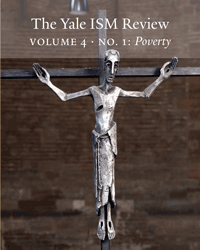“Poverty, in the sense of simplicity and freedom from the desire for material wealth, is an ancient virtue and a requirement for the religious life. Poverty, in the sense of deprivation and a depth of suffering inflicted on individuals and vast groups by the negligence and malice of those in positions of abusive power, however, is not to be confused with the understanding of poverty as freedom and simplicity. One form of poverty liberates. The other crushes.”
This observation of Ayla Lepine, in her discussion of church architecture and poverty, sets out one of the tensions discussed in this issue of The Yale ISM Review. To consider poverty, one must acknowledge deep and often complex conditions that cause real human suffering. Yet even in the midst of such conditions, it is possible to discover glimmers of the divine presence. Music, worship, and the arts have the potential to mediate and deepen such discoveries.
Our first three articles arise within specific contexts in the United States. Sara Miles shares her perspective on the Eucharist in connection with her experience of feeding the hungry at her parish in San Francisco. Patrick Jordan writes about Dorothy Day and how liturgical prayer was formative in her life and in the Catholic Worker movement that she co-founded in New York. Ron Jenkins describes what happened to inmates in a Connecticut prison when they read and explored Dante’s Divine Comedy in poetry and drama.
Our next two contributions hail from Central America. Spencer Reece’s translation of a poem (“Los Pobres”) by acclaimed Honduran poet Roberto Sosa, offers us haunting verbal images of life and death among the poor. Carlota Duarte’s reflection on the Chiapas Photography Project, which she began in 1992, introduces us to the hardships as well as the beauty of that region of Mexico. Her article is accompanied by a series of stunning photographic images from the project, whose goals of justice and empowerment reach beyond the art itself.
Faith invites us to step into a new world where the poor, as much as the rich, are valued and respected—as the reign of God requires. We therefore have included four articles that concern how Christians at worship celebrate the reign of God in ways that challenge us concerning poverty.
- Hymn writer Adam Tice wrestles with provocative questions about what believers at worship might sing, and to whom our hymn texts are addressed. Are we to sing “blessed are the poor” while omitting “woe to you who are rich”?
- Theologian Don Saliers draws our attention to the psalms, and discusses how they reveal a divine preference for the poor. The psalms stand as a powerful witness to this preference. How do we hear their message in cries of desolation and lament?
- Ayla Lepine takes us on a tour of several church structures located at crossroads of human need, each revealing a different synthesis of architecture, poverty, and the call to holiness. What sort of story does a chapel made with scrap wood and duct tape by migrants at Calais have to tell?
- Finally, Ruth Myers looks at ways that clothing in worship has played a role through the ages in crafting symbolic structures of meaning in communities of faith. From baptismal garments to clerical vesture, how might our decisions about what to wear in worship relate to the church’s mission?
In “One Final Note,” Helen Rhee then changes the direction of our theme by looking not at poverty but at wealth—specifically the role that wealth played in the transformation of early Christian worship. There are moral tensions here, which church theologians and pastors identified from an early date: “Material possessions and wealth in God’s creative intent are not intrinsically evil although through them their possessors may encounter a real and powerful temptation, danger, and a potential for wickedness and destruction.” How they understood and addressed these tensions in a critical time of transition has had consequences ever since.
There are no easy answers to the problems and struggles associated with poverty in the world today. The contributors to this issue of The Yale ISM Review show nonetheless that sacred music, worship, and the arts remain part of our human response and attempts at faithful grappling with this reality. We hope that what you read in these pages will spark new insights and enrich your own views.
Rita Ferrone, editor
February 14, 2018
